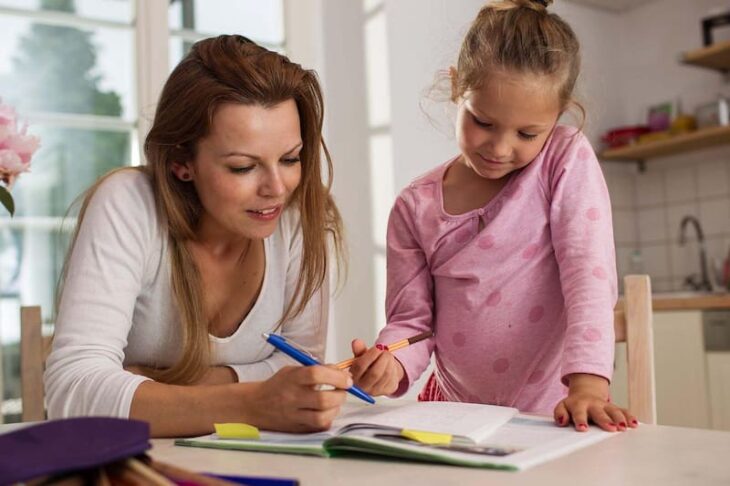Disclosure: Articles may contain affiliate links. As an Amazon Associate, we earn from qualifying purchases (at no additional cost to you). See our full disclosure here.
Last updated on August 26th, 2023 at 04:47 pm
Single parents are literal heroes, but protecting your children from all the dangers in the world isn’t easy.
Striking a balance between freedom and structure is difficult when you’re juggling work, household chores, helping your kids with homework, and trying to maintain boundaries when it comes to screen time. However, there are many ways you can protect your kids and make them feel secure without denying their autonomy.

How to Protect Your Kids as a Single Parent
Protection comes in many forms. Whether you’re getting a life insurance policy, signing your kids up for swimming lessons, or explaining internet safety, there’s a lot you can do to protect your children in the moment and for the future.
We’re outlining just a few tips below, but you can always ask other parents you admire for advice, talk to your child’s pediatrician, or read parenting books for single moms.
1. Purchase Life Insurance
It can be hard to talk about why single parents need life insurance, as the topic is sensitive. No one wants to think that something could happen to them or their children. But if a single parent takes out a policy for their children, their children will spend less on insurance once they’re older.
And, more importantly, parents need to protect their children if something happens to them. A life insurance policy can take care of the costs for childcare, housing expenses, their future education, and more. Plus, parents can decide on a beneficiary who will look after their children if they pass away before their children are grown.
2. Teach Them the Value of Money
The American education system doesn’t do enough to teach children the value of money, which is evident based on debt statistics. The average American is $90,460 in debt. High debt can impact your children’s mental health, physical health, and future–think about the ability to buy a home, for example.
To protect your children from that kind of financial fallout, you need to examine your own attitudes toward money and set a good example. Teach your children how to have a healthy relationship with money and how to avoid common cultural traps, like “keeping up with the Joneses,” that keep successful adults locked in a cycle of spending, credit, and debt.
3. Teach Them to Express Their Emotions
Children are born with the innate ability to express themselves, but society teaches them to be ashamed of their thoughts and feelings. While boys are more vulnerable to this expectation, girls are often “not taken seriously” in male-dominated spaces if they express their individuality.
Show your children that it’s okay to make mistakes and express their emotions. Explain what to do if their peers make fun of them for being themselves. Then, teach them that it’s okay to set boundaries when they’re asked to do or say something that makes them feel uncomfortable.

4. Explain Internet Safety
Speaking of peer pressure, parents need to teach their children how to protect themselves from strangers and how to report sexual or physical abuse if it occurs. However, many parents don’t talk about internet safety with their kids. It’s vital to do so, since simply trying to ban the internet or monitoring your children’s web activity won’t prevent them from logging on at school or when they’re with friends, for example.
The internet is, and will continue to be, an essential part of your child’s life, so it’s vital that you explain the risks involved with being online. Explain that anything they put on the internet will be available to the public forever and that they should never share private info on social media.
5. Bring Up Uncomfortable Topics
We should all lobby for proper sex, drug, and mental health education in schools because we aren’t sure what, if anything, other parents are discussing in the home. At the same time, you need to take it upon yourself to discuss uncomfortable topics for the purpose of protecting your children.
While bringing these issues up can be scary, keeping your children in the dark won’t prevent children from doing something illegal, or even life-threatening.
However, if you explain to your children why they should or shouldn’t do something (instead of just saying “no”), you’ll give them the power to make their own choices and protect themselves.
These are just some of the ways to protect your kids from an often difficult-to-navigate world. And, it can be a fine line between protecting them, but not making them fearful.
What are your thoughts? Leave us a comment below.
You can also find MomsWhoSave on Pinterest, Facebook, Instagram, and Twitter. Join us for updates.
Don’t miss a thing! Subscribe to MomsWhoSave’s blog posts below!
Leave a Reply